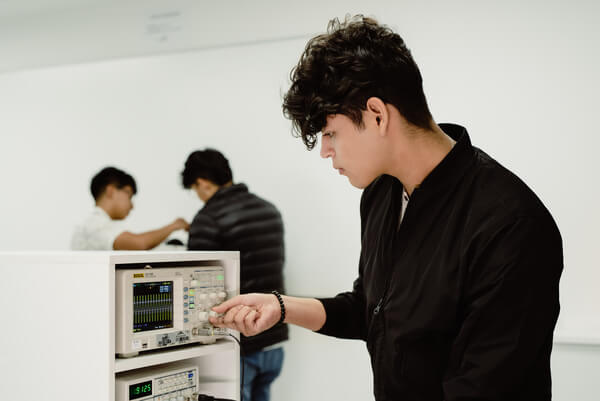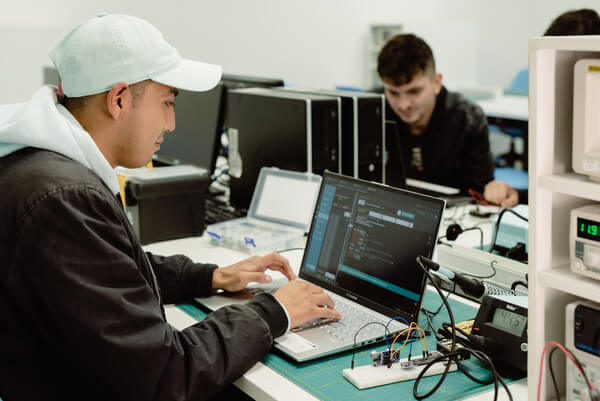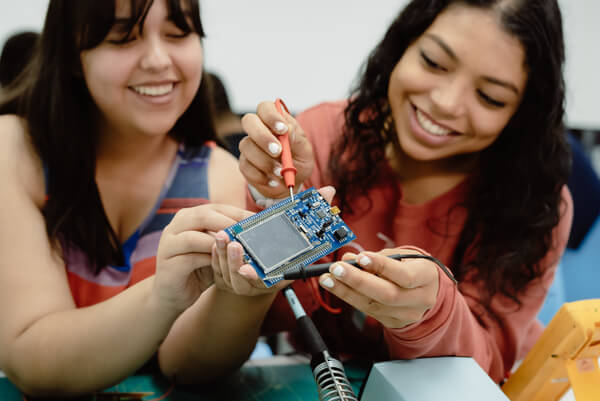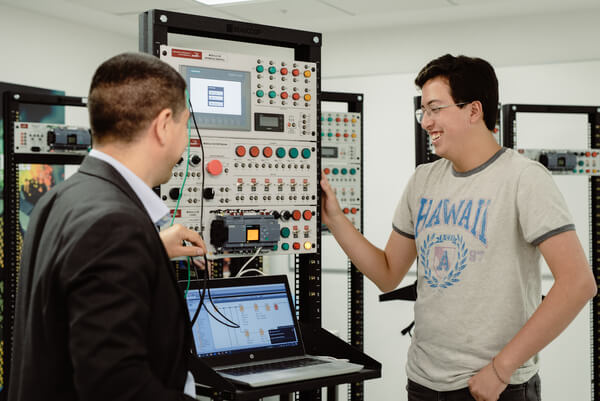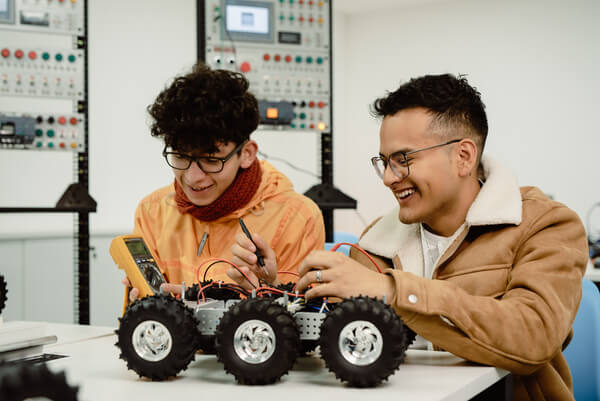Title : Bachelor in Electronics and Automation Engineering
Duration: 9 semesters
Modality: On site
** The curriculum may be subject to changes.
The program focuses on training professionals with expertise in designing and implementing comprehensive technological solutions across electronics, robotics, and process automation. It aims to enhance productivity, optimize resources, and shape graduates into leaders, innovators, entrepreneurs, with competence, ethics, and a keen business vision.
- Belong to student branches: ISA (International Society of Automation), IEEE (Institute of Electrical and Electronics Engineers).
- Have the continuous guidance and support of fully qualified, experienced, and internationally trained full-time faculty.
- LABORATORIES: Access and utilize the new and modern state-of-the-art laboratories that will allow you to explore the latest developments in electronics, robotics, and industrial automation.
- UITEC: Be part of UDLA’s Technological Innovation Unit (UITEC), developing innovative projects, and participating nationally and internationally in electronics, robotics, automation, and innovation competitions.
- Infrastructure: You will be able to enjoy our new and modern facilities that provide all the conveniences for your learning process.
- Throughout your academic journey, you will develop abilities to apply fundamental principles of logic, mathematics, reasoning, and analysis, complemented by scientific methods, to formulate and resolve complex problems. This proficiency will empower you to design electronic systems for controlling, instrumenting, and managing power and energy in alignment with the specific needs and demands of industrial production processes.
- You will be a highly proficient professional, adept at implementing cutting-edge control and monitoring systems for production processes and upholding strict adherence to both national and international standards. Your capabilities will extend to executing engineering projects focused on process automation and industrial robotics in companies across the manufacturing and service sectors.
- You will be equipped to manage technological solutions tailored to enhance industrial processes, ensuring the fulfillment of quality and productivity requirements.
Ecuador requires qualified and well-prepared professionals to access highly specialized jobs in electronics and automation. In the Metropolitan District of Quito, 20% of the country's productive industry is concentrated, along with more than a quarter of the job market (26%) and 49% of Research and Development. Therefore, there is a significant demand for highly paid work that involves designing, building, installing, maintaining, commercializing, and generating industrial automation projects.
Graduates of the electronics and automation program have excellent job opportunities in the following productive sectors of the country:
Energy Sector
Industrial Sector
Government Sector
Service Sector
Entrepreneurship Opportunities
The Electronics and Automation Engineer from the Universidad de Las Americas is a competent professional with a strong foundation in state-of-the-art technologies. Graduates are capable of innovating, undertaking entrepreneurial ventures, and effectively managing projects in the field of electronics and automation while adhering to norms, regulations, and national and international standards.
Students can solve complex engineering problems by demonstrating knowledge and skills inherent to their field. They design and develop automation projects, considering aspects of well-being, safety, and public health, while considering economic, environmental, social, and global factors. Within their profession, students are responsible and ethical, effectively communicating their judgments, working efficiently, and providing leadership within collaborative and inclusive multidisciplinary teams. They also excel in developing, analyzing, and interpreting data appropriately, enabling them to acquire and apply knowledge to increase productivity, enhance quality, and reduce costs in both productive and service sectors.
Electronics and Automation Engineers are expected to perform various roles within multidisciplinary teams, in national and international contexts, applying their technical knowledge and comprehensive education. They conduct themselves with ethics, respect the current legal framework, and prioritize the best interests of society, remaining committed to the country's development.
- Train professionals to master logical, mathematical, and engineering principles, adhering to technological norms and standards. This training encompasses a balanced mix of theoretical knowledge, practical skills, and research capabilities, enabling students to analyze, design, implement, automate, and manage industrial-level productive processes.
- Form integral individuals who are responsible, supportive, critical, participative, and productive, that contribute to the integral development of society through the generation and transfer of knowledge in national or international contexts.
- Strengthen integral skills and lifelong technological adaptability through ongoing training and updating.
- Add value to organizations by exercising the profession with values and ethical principles.
A graduate of the Electronics and Automation Engineering program will be able to:
- Identify, formulate, and solve complex engineering problems by applying principles of engineering, science, and mathematics.
- Apply engineering design to produce solutions that meet specific needs with consideration of public health, safety, and welfare, as well as global, cultural, social, environmental, and economic factors.
- Communicate effectively with a range of audiences within the field.
- Recognize ethical and professional responsibilities in engineering situations and make informed judgments, which must consider the impact of engineering solutions in global, economic, environmental, and societal contexts.
- Works effectively in a team whose members, together, exercise leadership, create a collaborative and inclusive environment, set goals, plan tasks, and accomplish objectives.
- Develop and conduct appropriate experimentation, analyze, and interpret data, and use engineering judgment to draw conclusions.
- Acquire and apply new knowledge as needed, using appropriate learning strategies.
| Title | Name |
| Dean of the College of Engineering and Applied Sciences | Diego Buenaño |
| Program Director of Electronics and Automation Engineering | Jorge Luis Rosero |
| Professor responsible for monitoring alumni | Paúl Fabara |
Curricular Professor | David Pozo |
| Employers’ representatives and/or representatives of professional associations or guilds | Danilo Alvarado (President) Andrea Viteri Daniel Capelo Jaime Constante |
| Alumni | Maria Eliza Moreno Aura Erazo Mateo Domínguez Rubén Macías Bryan Velasco |
Bachelor
Academic Year | 2019 | 2020 | 2021 | 2022 | 2023 |
Number of Students | 40 | 59 | 92 | 135 | 183 |
If you are enrolled in another university, you can have your courses recognized through our simulator and study at UDLA.
Apply here
